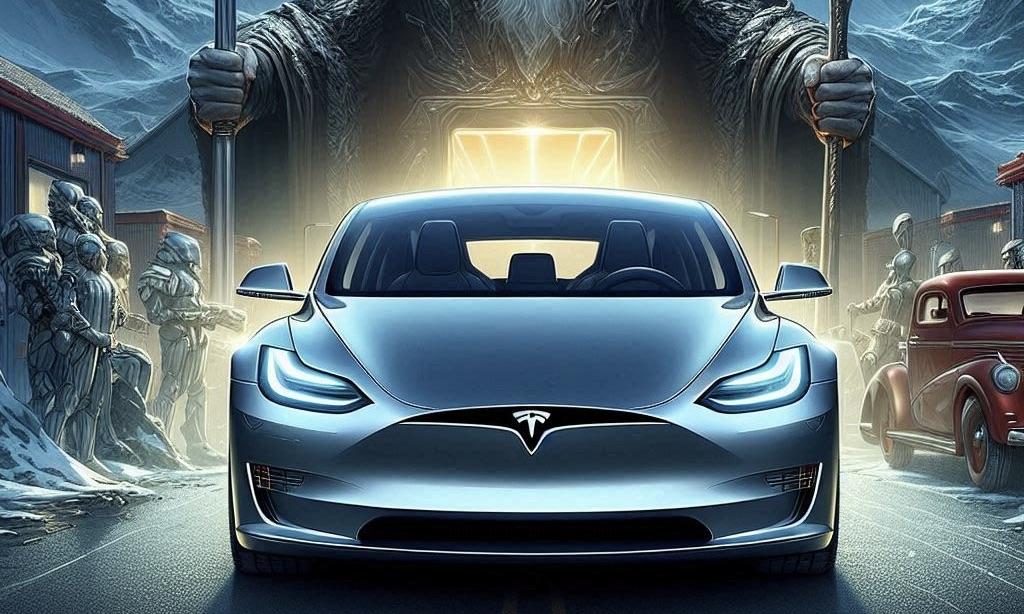Tesla's quality rating has declined in J.D. Power's 2024 Initial Quality Study, released on June 27, due to controversial design changes. The removal of turn-signal stalks and relocation of key functions have frustrated owners and raised concerns about increased distractions.
Tesla's Quality Declines in 2024 J.D. Power Study Amid Controversial Design Changes, Frustrating Owners
As Bloomberg reported, Tesla Inc.'s quality, once a benchmark for the entire electric vehicle market, has now declined, as evidenced by a decrease in its score in J.D. Power's Initial Quality Study for the 2024 model year, released on June 27. This decline, following controversial design changes, including removing turn-signal stalks, has frustrated owners and sent ripples of concern across the industry.
Once the undisputed leader in electric vehicle quality, Tesla finds itself on par with Rivian Automotive Inc. and legacy manufacturers like General Motors Co. The study, a bellwether for vehicle reliability during the first three months of ownership, has revealed significant dissatisfaction among Tesla owners. The relocation of fundamental functions, such as the horn and window controls from the center of the steering wheel to a button on the wheel spoke, and the replacement of turn-signal stalks with directional arrow controls have not been well-received.
In an interview, Frank Hanley, J.D. Power’s senior director of auto benchmarking and study's author, noted, “It’s not being well received. In an emergency, when you have to hit the horn, you don’t necessarily want to have to think about it. We see customers commenting that eyes-off-the-road time is increasing because they have to hunt around.”
Ram Tops J.D. Power Quality Rankings; EV Makers Lag Behind with Higher Problem Rates
The study revealed that Ram, Stellantis NV's truck and van division, topped the rankings with 149 problems per 100 vehicles, followed by GM's Chevrolet and Hyundai Motor Co.'s namesake brand.
According to MSN, Porsche was the most problematic luxury manufacturer, with 172 issues per 100 vehicles, followed by Toyota Motor Corp.'s Lexus line and Hyundai's Genesis premium brand. The industry average was 195 issues per 100 vehicles, with Stellantis' Dodge model line at the bottom for non-electric vehicles, having 301 issues.
Electric vehicle manufacturers fared worse in the study. Tesla and Rivian had 266 problems per 100 vehicles, while Polestar had the most issues at 316 per 100. Hanley explained that while EVs have fewer components that can wear out, they often feature cutting-edge technology that can fail, leading EV owners to visit dealerships at a rate three times higher than gas-powered vehicle owners.
General Motors emerges as a beacon of success in the industry, earning six segment awards, including top rankings for the Chevy Equinox as the most problem-free compact SUV and the Chevy Silverado as the top heavy-duty pickup truck. This success story from a legacy manufacturer provides a glimmer of hope for the industry's future.
Ford's redesigned F-150 pickup, the company’s best-seller, was not included in this year's study because the automaker reserved 60,000 units for additional quality inspections in the first quarter. According to Hanley, this exclusion had a dual impact, as the gas-powered F-150 generally boasts high quality, whereas the electric F-150 Lightning has been subpar.
Photo: Microsoft Bing



 Global PC Makers Eye Chinese Memory Chip Suppliers Amid Ongoing Supply Crunch
Global PC Makers Eye Chinese Memory Chip Suppliers Amid Ongoing Supply Crunch  SoftBank Shares Slide After Arm Earnings Miss Fuels Tech Stock Sell-Off
SoftBank Shares Slide After Arm Earnings Miss Fuels Tech Stock Sell-Off  Nvidia Nears $20 Billion OpenAI Investment as AI Funding Race Intensifies
Nvidia Nears $20 Billion OpenAI Investment as AI Funding Race Intensifies  Oracle Plans $45–$50 Billion Funding Push in 2026 to Expand Cloud and AI Infrastructure
Oracle Plans $45–$50 Billion Funding Push in 2026 to Expand Cloud and AI Infrastructure  Anthropic Eyes $350 Billion Valuation as AI Funding and Share Sale Accelerate
Anthropic Eyes $350 Billion Valuation as AI Funding and Share Sale Accelerate  Alphabet’s Massive AI Spending Surge Signals Confidence in Google’s Growth Engine
Alphabet’s Massive AI Spending Surge Signals Confidence in Google’s Growth Engine  SpaceX Updates Starlink Privacy Policy to Allow AI Training as xAI Merger Talks and IPO Loom
SpaceX Updates Starlink Privacy Policy to Allow AI Training as xAI Merger Talks and IPO Loom  Nvidia CEO Jensen Huang Says AI Investment Boom Is Just Beginning as NVDA Shares Surge
Nvidia CEO Jensen Huang Says AI Investment Boom Is Just Beginning as NVDA Shares Surge  AMD Shares Slide Despite Earnings Beat as Cautious Revenue Outlook Weighs on Stock
AMD Shares Slide Despite Earnings Beat as Cautious Revenue Outlook Weighs on Stock  SpaceX Seeks FCC Approval for Massive Solar-Powered Satellite Network to Support AI Data Centers
SpaceX Seeks FCC Approval for Massive Solar-Powered Satellite Network to Support AI Data Centers  Jensen Huang Urges Taiwan Suppliers to Boost AI Chip Production Amid Surging Demand
Jensen Huang Urges Taiwan Suppliers to Boost AI Chip Production Amid Surging Demand  Nvidia, ByteDance, and the U.S.-China AI Chip Standoff Over H200 Exports
Nvidia, ByteDance, and the U.S.-China AI Chip Standoff Over H200 Exports  Nintendo Shares Slide After Earnings Miss Raises Switch 2 Margin Concerns
Nintendo Shares Slide After Earnings Miss Raises Switch 2 Margin Concerns  Palantir Stock Jumps After Strong Q4 Earnings Beat and Upbeat 2026 Revenue Forecast
Palantir Stock Jumps After Strong Q4 Earnings Beat and Upbeat 2026 Revenue Forecast  Sam Altman Reaffirms OpenAI’s Long-Term Commitment to NVIDIA Amid Chip Report
Sam Altman Reaffirms OpenAI’s Long-Term Commitment to NVIDIA Amid Chip Report 































